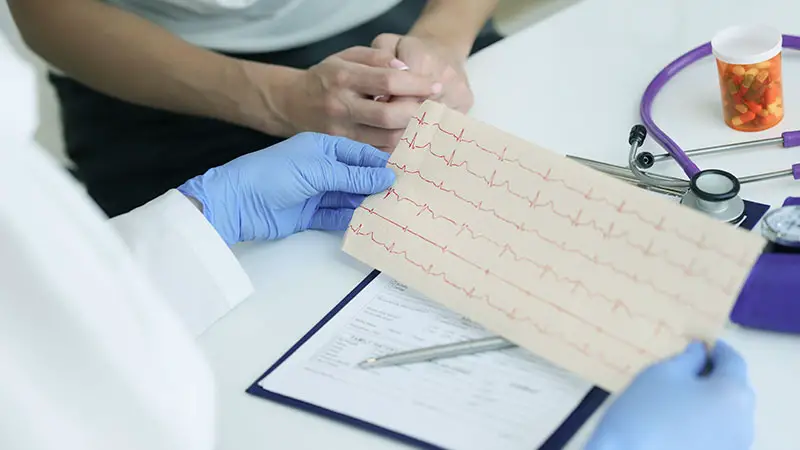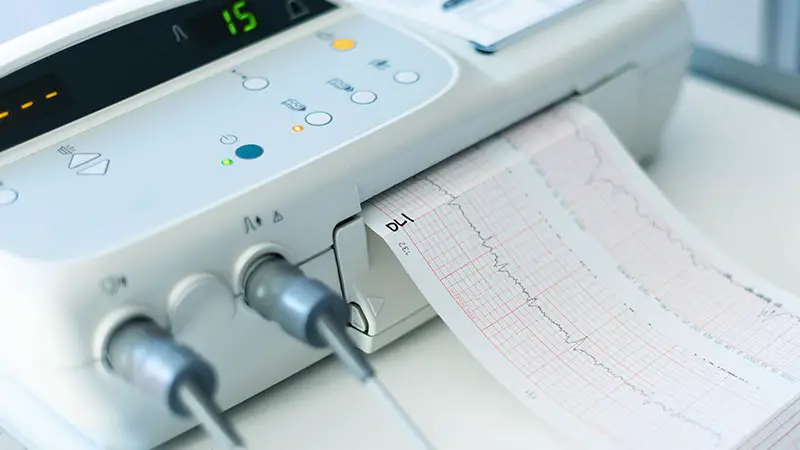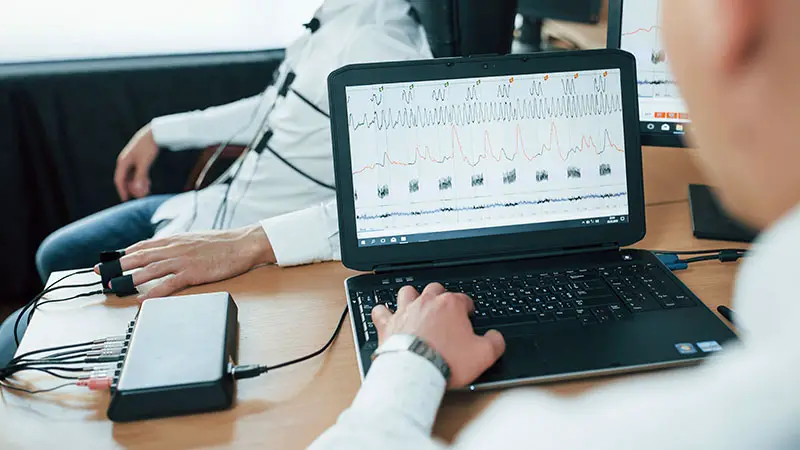Are you proactive about your heart health? One essential tool for staying ahead of heart disease is the annual EKG screening test. This non-invasive procedure provides valuable insights into the electrical activity of your heart, helping to detect abnormalities early on.
By measuring the heart’s rhythm, rate, and electrical patterns, an EKG can identify conditions such as arrhythmias, ischemia, and structural abnormalities before symptoms manifest.
Understanding the importance of these screenings is crucial for maintaining cardiovascular health and preventing serious complications.
This blog post explores why annual EKG screenings are vital, what to expect during the test, and how they contribute to effective heart disease management.
Whether you’re considering your first screening or looking to understand its benefits better, embracing this preventive measure can significantly impact your long-term heart health journey. So, stay focused.

What Is the Annual EKG Screening Test?
An annual EKG (electrocardiogram) screening test is a non-invasive procedure used to assess the electrical activity of the heart. It involves placing electrodes on the skin to measure the heart’s rhythm, rate, and electrical activity.
This test helps detect various heart conditions such as arrhythmias (irregular heartbeats), coronary artery disease, and heart muscle abnormalities.
During the test, the electrodes transmit signals to an EKG machine, which records these electrical impulses as waves on graph paper or a digital display. Doctors analyze these patterns to identify any abnormalities or signs of heart disease.
The annual EKG screening is often recommended for individuals at higher risk of heart problems due to factors like age, family history, smoking, high blood pressure, or diabetes.
It serves as a valuable tool for early detection and monitoring of heart conditions, enabling timely intervention and management.
However, it’s important to note that EKG screening alone may not provide a comprehensive assessment of heart health, and additional tests or evaluations may be required based on individual health risks and symptoms.
What Can I Know from the Annual EKG Screening Test

An annual EKG (electrocardiogram) screening test provides valuable insights into the electrical activity of the heart, offering critical information that helps in assessing heart health and detecting potential abnormalities.
Here are several key aspects that can be gleaned from an annual EKG screening:
Heart Rhythm Assessment
The primary function of an EKG is to evaluate the heart’s rhythm. It records the timing and duration of each electrical phase in the cardiac cycle, detecting irregularities such as arrhythmias (irregular heartbeats).
This information is crucial for diagnosing conditions like atrial fibrillation or ventricular tachycardia.
Heart Rate
The EKG provides an accurate measurement of the heart rate, which is the number of times the heart beats per minute. A normal heart rate range varies with age and fitness levels, and deviations can indicate underlying issues such as hyperthyroidism or bradycardia.
Detection of Ischemic Changes
Ischemia, or reduced blood flow to the heart muscle, can manifest as specific changes in the EKG pattern during stress tests or even at rest. These changes can indicate coronary artery disease and help guide further diagnostic procedures.
Identification of Structural Abnormalities
EKG can sometimes detect abnormalities in the heart’s structure, such as enlarged chambers or thickened heart walls. These findings may prompt further imaging studies like echocardiography to assess cardiac structure and function comprehensively.
Monitoring Effects of Medications
For individuals with known heart conditions, an annual EKG can monitor the effects of medications prescribed to regulate heart rhythm or manage blood pressure. It helps healthcare providers adjust treatment plans as needed based on observed changes in the EKG patterns.
Screening for Silent Heart Conditions
In some cases, individuals may have asymptomatic heart conditions that can be detected through routine EKG screening. Early identification allows for timely intervention, potentially preventing complications such as heart failure or sudden cardiac arrest.
Baseline for Future Comparisons
Establishing a baseline EKG during annual screenings provides a reference point for comparison in subsequent years. Changes in the EKG over time can signal evolving heart conditions or response to treatment, guiding ongoing management strategies.
While an annual EKG screening is a valuable tool for assessing heart health and detecting abnormalities, it is typically part of a comprehensive cardiac evaluation.
Why the Annual EKG Screening Test Is Beneficial for Heart Disease

Annual EKG screenings offer numerous benefits for heart disease management.
These tests enable early detection of abnormalities, monitor disease progression, evaluate treatment effectiveness, assist in risk stratification and preventive care, and establish a baseline for future comparisons, enhancing overall heart health and patient outcomes.
Early Detection of Heart Abnormalities
One of the primary benefits of an annual EKG screening test is the early detection of heart abnormalities. EKGs can reveal arrhythmias, ischemic changes, and other electrical irregularities that may not present with obvious symptoms.
Early detection is crucial because it allows for timely intervention and management of heart conditions before they progress to more severe stages.
For example, identifying arrhythmias early can prevent complications such as stroke or heart failure, and detecting ischemic changes can prompt further investigations and treatment to prevent heart attacks.
Monitoring Heart Disease Progression
For individuals with known heart conditions, annual EKG screenings are vital for monitoring disease progression. EKGs provide a consistent and objective measure of heart function over time, helping doctors track changes and adjust treatment plans accordingly.
This ongoing monitoring is particularly beneficial for managing chronic conditions such as atrial fibrillation, congestive heart failure, and coronary artery disease.
Regular EKGs can help ensure that medications are effective and that the condition is not worsening, which is essential for maintaining optimal heart health and preventing complications.
Evaluating the Effectiveness of Treatments
Annual EKG screenings also play a significant role in evaluating the effectiveness of treatments for heart disease.
Whether a patient is taking medications, undergoing lifestyle changes, or recovering from surgery, EKGs can provide critical feedback on how well the treatment is working.
For example, they can show whether anti-arrhythmic drugs are successfully regulating heart rhythm or if a pacemaker is functioning correctly.
This information is invaluable for healthcare providers to make informed decisions about continuing, adjusting, or changing treatment strategies.
Risk Stratification and Preventive Care
EKG screenings are beneficial for risk stratification and preventive care, especially in individuals with multiple risk factors for heart disease.
By identifying subtle changes in heart function, EKGs can help stratify patients based on their risk of developing serious cardiac events.
This stratification enables more personalized preventive care, allowing high-risk individuals to receive targeted interventions such as lifestyle modifications, medications, or more frequent monitoring.
Preventive measures guided by EKG results can significantly reduce the incidence of heart attacks, strokes, and other cardiovascular events.
Establishing a Baseline for Future Comparisons
An annual EKG provides a valuable baseline for future comparisons. Having a record of the heart’s electrical activity over the years allows healthcare providers to detect and interpret changes more accurately.
This baseline is particularly useful when patients present with new symptoms or changes in their condition.
Comparing current EKG results with previous ones can help identify new developments and assess whether they are benign variations or signs of a worsening condition. Establishing a baseline thus enhances the accuracy and reliability of cardiac assessments over time.
Annual EKG screenings are a beneficial tool for the early detection and monitoring of heart disease.
They allow for the identification of heart abnormalities, track disease progression, evaluate treatment effectiveness, facilitate risk stratification and preventive care, and provide a baseline for future comparisons.
These benefits collectively contribute to better heart health management, potentially reducing the incidence of severe cardiovascular events and improving patient outcomes.
How to Do An Annual EKG Screening Test?

An annual EKG screening test is a vital tool for assessing heart health. From scheduling the appointment to analyzing results, understanding the process ensures effective detection and management of heart conditions.
This guide outlines the steps involved in conducting an annual EKG, ensuring comprehensive care and early intervention where necessary.
Scheduling the Appointment
The first step in getting an annual EKG screening test is to schedule an appointment with your healthcare provider or a cardiologist. This can be done through a primary care physician who can provide a referral, or by directly contacting a cardiology clinic.
It’s essential to inform the provider of any symptoms you may be experiencing and your medical history, as this information can help tailor the test to your needs.
Preparation for the Test
Preparing for an EKG is straightforward, with minimal requirements. Generally, no special preparations are needed, but wearing loose, comfortable clothing can make it easier to attach the electrodes.
It is advisable to avoid applying lotions or oils on your skin before the test, as they can interfere with the electrode contact. Make sure to inform the technician or doctor about any medications you are taking, as some drugs can affect the EKG results.
Placement of Electrodes
During the EKG test, you will be asked to lie down on an examination table. The technician will place small adhesive electrodes on your chest, arms, and legs. These electrodes are connected to the EKG machine via wires.
The placement of the electrodes is critical as it ensures an accurate recording of the heart’s electrical activity from different angles.
Recording the Electrical Activity
Once the electrodes are in place, you will need to remain still and breathe normally. The EKG machine will then record the electrical impulses generated by your heart. This process usually takes just a few minutes.
The machine translates these impulses into a series of waves displayed on graph paper or a digital screen, representing the electrical activity during each heartbeat.
Analyzing the Results
The recorded EKG data will be reviewed by a healthcare provider. They will look for any irregularities in the heart’s rhythm, rate, and electrical pattern.
Common findings might include arrhythmias, ischemia, or other abnormalities. If the EKG reveals any issues, further tests such as an echocardiogram or stress test might be recommended for a more comprehensive evaluation.
Discussing the Findings
After analyzing the EKG, the healthcare provider will discuss the results with you. If the test is normal, it provides reassurance and a baseline for future comparisons.
If abnormalities are detected, the provider will explain the significance of the findings and outline potential next steps. This may include lifestyle changes, medications, or additional diagnostic tests to further investigate the condition.
Follow-Up and Ongoing Care
Based on the results of the annual EKG, follow-up appointments may be necessary. Regular monitoring and ongoing care are crucial, especially if any abnormalities are found.
Your healthcare provider might suggest more frequent EKGs or other heart-related tests to closely monitor your condition and adjust treatment plans as needed.
Wrapping Up
Annual EKG screening tests play a pivotal role in proactive heart disease management. By detecting irregularities in heart rhythm, assessing the effectiveness of treatments, and providing a baseline for future comparisons, EKGs enable early intervention and personalized care.
This routine procedure not only helps in monitoring disease progression but also supports preventive measures tailored to individual risk factors.
Regular screenings empower healthcare providers to make informed decisions, potentially mitigating the impact of cardiovascular conditions before they escalate.
Ultimately, incorporating annual EKGs into healthcare routines enhances overall heart health outcomes, ensuring that patients receive timely attention and interventions suited to their specific cardiac needs.
Emphasizing the importance of these screenings underscores their significance in maintaining optimal heart health and improving quality of life. Thank you so much.
